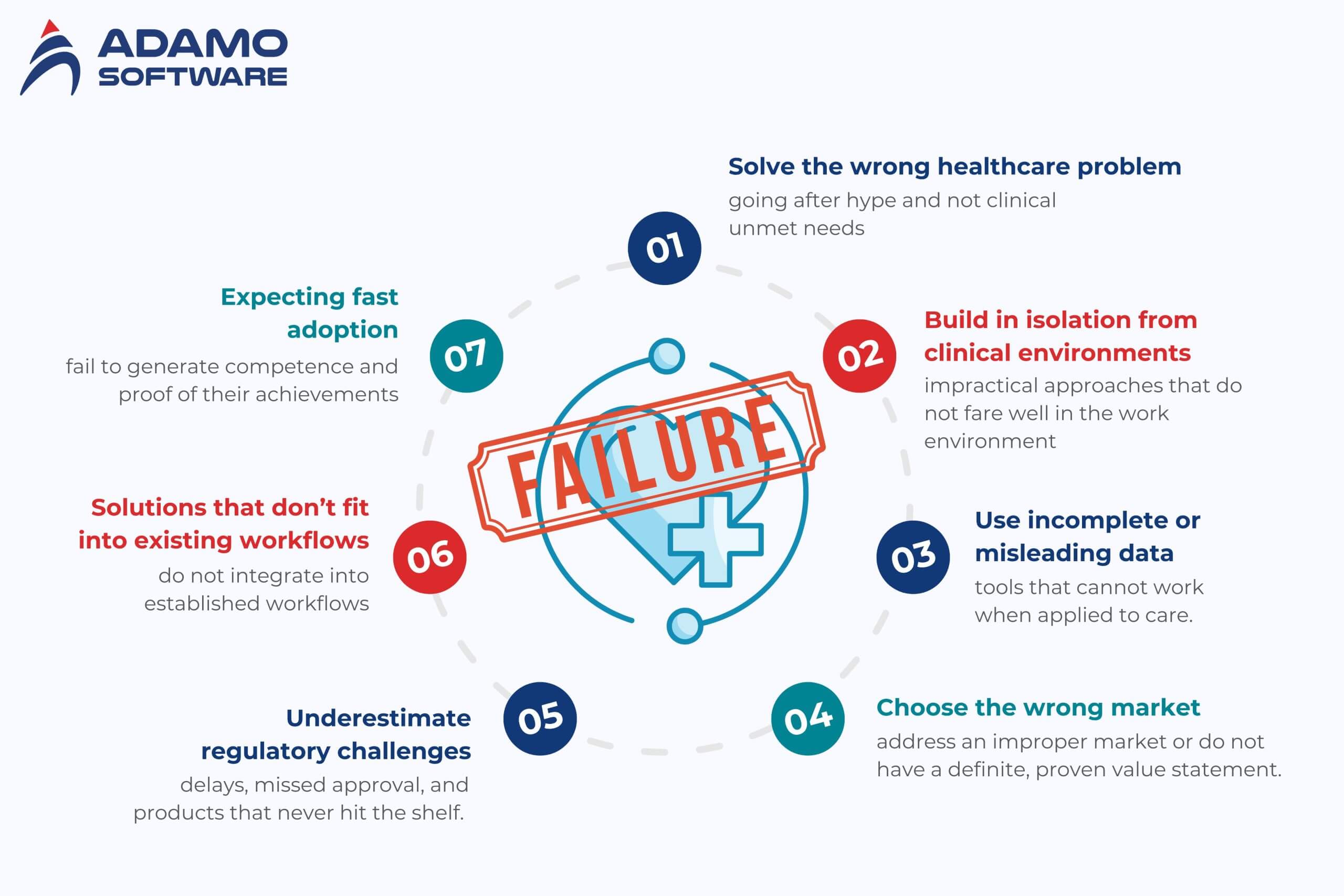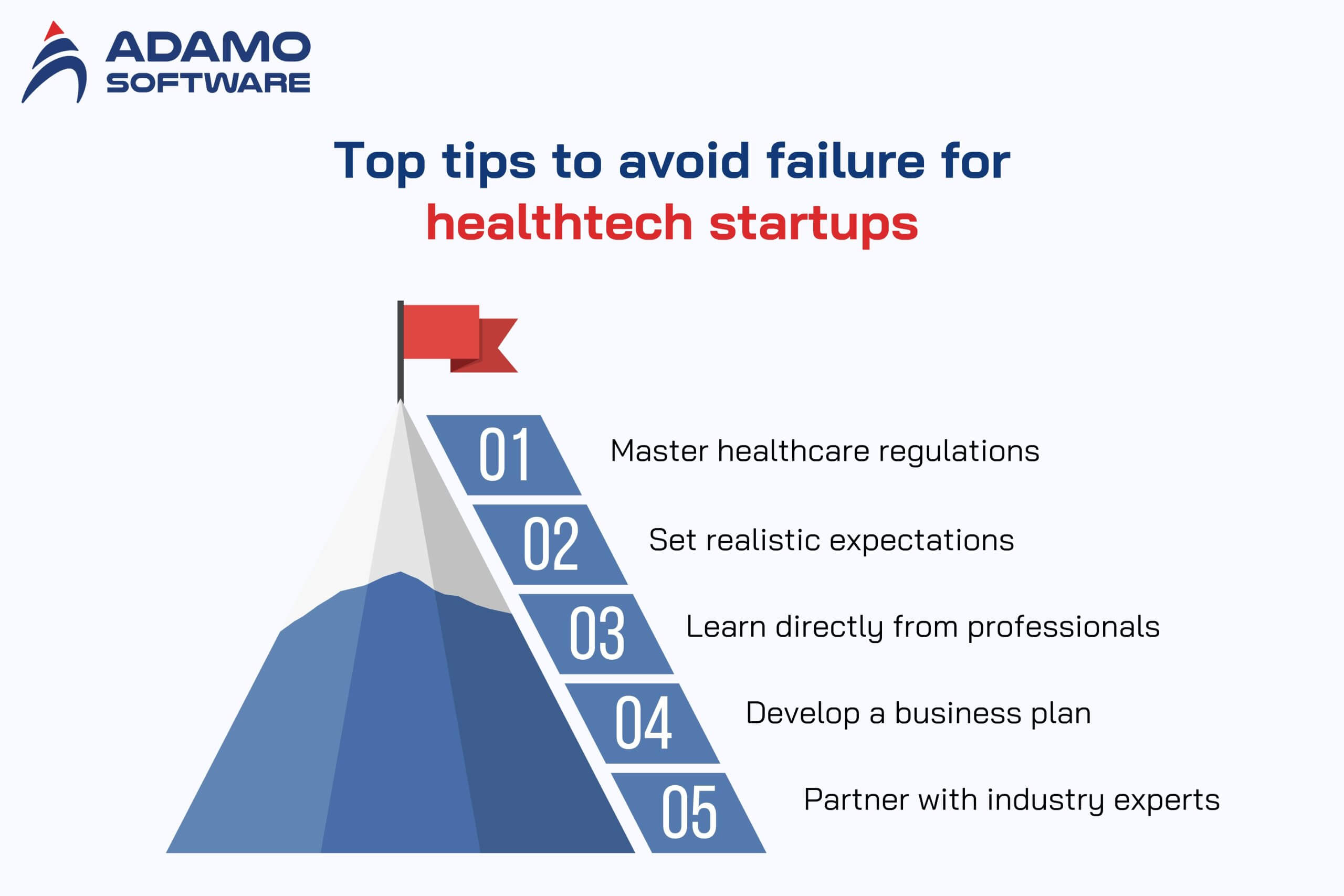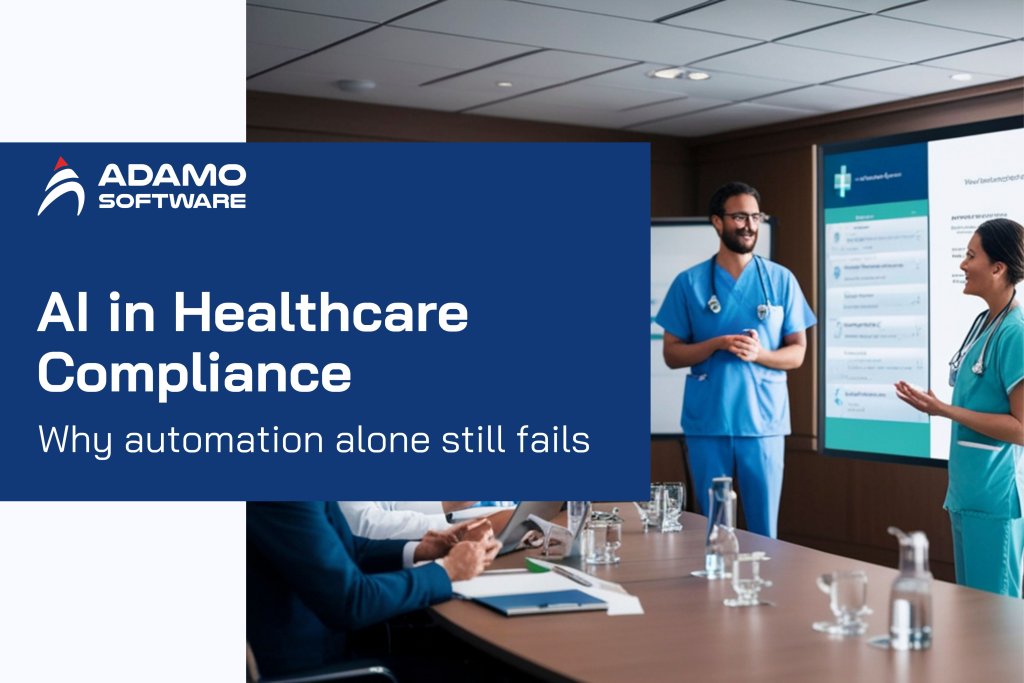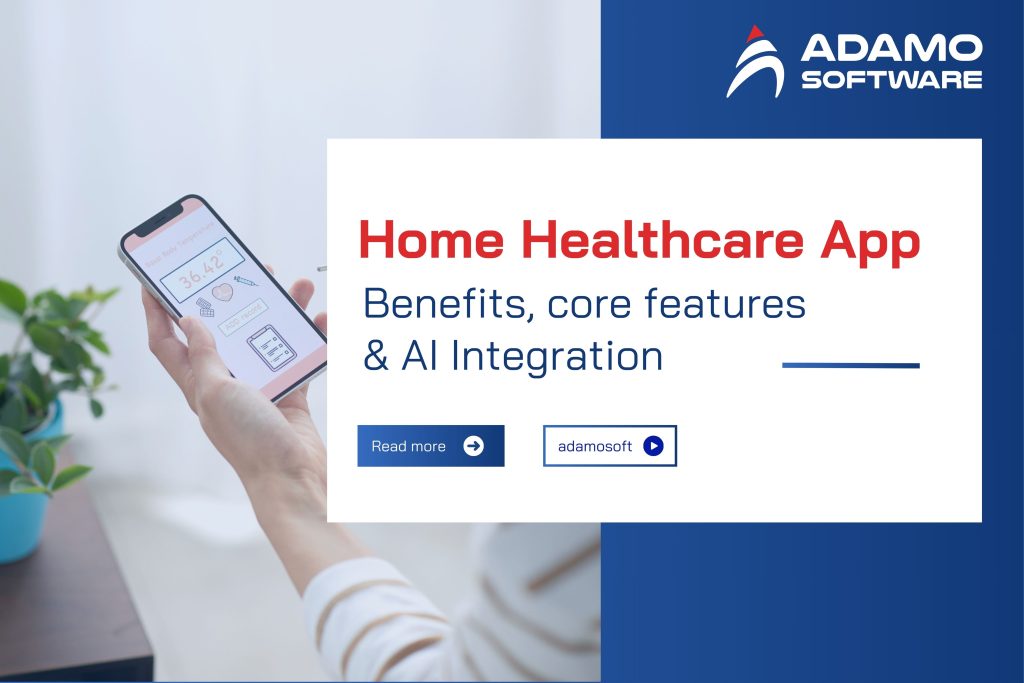Healthtech Startups: 7 Reasons they Fail (And 5 Ways to Stay in the Game)

Healthtech startups face high failure rates. Learn why and how to avoid common pitfalls with five key strategies for long-term success.
Numerous innovative healthtech startups are out there, but not all of them succeed. So many aspiring projects have failed to achieve product-market fit.
To assist you in finding your way around building successful healthtech startups, this article will dive into several main points:
- Top 7 reasons why healthtech startups are easy to fail
- Top tips to avoid failures for healthtech startups
- Case study of one example among successful healthtech startups
Now, let’s find out what should be done and make a difference in the future of your healthtech startups.
I. Top 7 reasons why Healthtech startups are easy to fail
First, you should explore about What is healthtech: An ultimate guide for starters here.
Healthtech startups are now in the innovation and funding boom. However, not all healthtech startups manage to last long.
All these failures are not coincidental. Most of them are related to some root causes, including selecting the wrong problem and failing to consider how the healthcare systems work.
This section explains the seven most significant factors that led to the failure of many healthtech startups:

- Solving the wrong healthcare problem: Most healthtech startups have failed because of going after hype and not clinical unmet needs.
- Building in isolation from clinical environments: Startups that are developed without clinical involvement usually come up with impractical approaches that do not fare well in the work environment.
- Using incomplete or misleading data: Poor data-driven healthtech apps result in tools that cannot work when applied to care.
- Choosing the wrong market and communication strategy: Even powerful healthtech startups fail when they address an improper market or do not have a definite, proven value statement.
- Underestimating regulatory challenges: Those healthtech startups that do not consider regulation can expect delays, missed approval, and products that never hit the shelf.
- Designing solutions that don’t fit into existing workflows: The healthtech tools that do not integrate into established workflows are usually neglected, regardless of their innovativeness.
- Expecting fast adoption without earning trust: Healthtech startups possibly do go astray when they desire rapid adoption yet fail to generate competence and proof of their achievements beforehand.
1. Solving the Wrong Healthcare Problem
Some healthtech startups are created with a glamorous idea, but not clinical demand.
In cases when teams have no clinical skills, they only tend to concentrate on matters that do not contribute to implementation. Consequently, they spend time and resources developing features that are not requested by healthcare professionals and are unnecessary to the patient.
A 2020 overview of over 400 AI-based health initiatives in COVID-19 found that none were ready to use clinically. This demonstrates that going off track can be very easy when there is no backup to the healthcare ecosystem.
2. Building in Isolation from Clinical Environments
Healthtech startups that are not familiar with real healthcare facilities often operate in the dark as a result.
Lacking the understanding of clinicians and the hospital processes, they cannot develop a product that will work in the real world.
Undoubtedly, clinical professionals will need to critically evaluate what is useful, what is irrelevant, and what is a possible risk. Hence, isolated-built products might be theoretically fantastic, but are doomed to fail under healthcare delivery challenges.
3. Using Incomplete or Misleading Data
Healthtech becomes cutting-edge when backed by appropriate data, and only when the data is accurate and comprehensive.
Numerous healthtech startups are based on research data that cannot be applied in real-world care environments. The results are ineffective models and tools when applied in real-life situations.
Most of the time, healthtech startups struggle to grow when the data they receive is not diverse or relevant. Solutions that are too clean or out of context would limit their progress. To create real value, startups need access to complicated and varied healthcare data.
4. Choosing the Wrong Market and Communication Strategy
Even remarkable products do not always win, especially when targeted at the wrong population.
Healthtech startups are personal sales to customers without considering that medical professionals and administrators dictate adoption.
Many healthtech startups try to make personal sales to customers. However, little do they know that it is medical professionals and administrators who are responsible for those product adoptions.
In other cases, healthcare startups don’t focus on communicating their values. With healthcare products, we must say more than just about cost-effectiveness or speed.
5. Underestimating Regulatory Challenges
The healthtech business is not a quick industry, and that is not by mistake.
The healthtech startups must follow strict rules, ethical frameworks, and industry-related regulations. Although this can be frustrating, keeping patients, providers, and institutions secure is crucial.
Without the knowledge of those frameworks, some startups run into the launch or trial of their products hastily. The result? Missed deadlines, approvals that never happened, and unreleased products.
Compliance does not represent a tick in the box – it is a journey that demands vision and expertise.
Ready to Outsource?
Get top-tier IT talent without the hassle. Contact us now!
6. Designing Solutions That Don’t Fit Into Existing Workflows
The effectiveness of a digital product is pointless unless it functions in the healthcare system.
Most healthtech startups create tools that involve additional procedures, new training, or significant workflow modifications. However, clinics and hospitals already have too much on their plate. Therefore, healthcare employees will never use tools that increase complexity, however innovative such tools may be.
Consider Lantern, a promising mental health mobile app in the U.S. They created a product enabling users to deal with anxiety and depression. Their idea was solid, but they failed to change Americans’ slow pace regarding healthcare and insurance. They underestimated the time needed to develop the right business model, and so they would not earn money on time.
7. Expecting Fast Adoption Without Earning Trust
The use of healthtech is not like other commonly used technology. It cannot be thrown out into the world, hoping it gains traction immediately.
Healthtech startups must establish trust at several levels – physicians, patients, payers, hospital admins, etc.
Some entrepreneurs believe that a special product will be self-promoting. In medicine, however, credibility is more important than novelty.
Many companies rush to build large sales forces without a clear product-market direction, which often results in wasted capital and delayed revenue.
Establishing trust requires a strong foundation built on clinical trials, adherence to safety standards at venues, and clear evidence of ROI. Usually, achieving this level of trust takes years of dedicated effort and commitment, not just some overnight magic.
II. Top tips to avoid failure for healthtech startups
There are pitfalls on the way to success for the healthtech startup, including rigid regulations and intricate market conditions. The issues are true, but not failure. With proper strategies in place, healthtech startups can avert the usual trappings that have resulted in the collapse of many promising ventures.

The following are five essential guidelines that healthtech startups to improve the likelihood of success in the long run:
- Master healthcare regulations from the start
- Set realistic expectations for growth and revenue
- Learn directly from healthcare professionals
- Develop a business plan you CAN execute
- Partner with experienced tech and industry experts
1. Master Healthcare Regulations From the Start
The regulations in the healthcare sector are not a matter of negotiation, and they are more complicated than startups expect.
Savvy healthtech companies do not treat compliance as an after-launch list of things to worry about. They instill the implications of compliance knowledge into their very first plans. As a rule, you need to understand privacy laws, medical device categories, and ethical approvals before starting product development.
Delays in compliance among startups usually take devastating turns in the form of delayed launches, legal penalties, or unsuccessful certifications. It is also time- and money-consuming to fix a regulatory issue after it has emerged.
However, through preemptive planning, regulatory challenges can be overcome more easily and without the detours and delays that might jeopardize product development.
2. Set Realistic Expectations for Growth and Revenue
Healthcare is not a dynamic industry, directly reflecting the rate at which a healthtech startup can expand. Whether creating sales cycles or laborious authorizations, almost every element in getting to market is lengthier than in other industries.
Entrepreneurs who join the market with the understanding that fast growth is expected will most likely be disappointed. Instead, healthtech startups should anticipate gradual but constant growth and ensure that their financial plans acknowledge this.
Long periods in sales, alliance, and tests of the product must be planned. Those focused on long-distance races, rather than quick wins, are better equipped to overcome initial hurdles and build lasting credibility.
3. Learn Directly from Healthcare Professionals
One of the fastest ways to understand healthcare is by learning from individuals who have successfully navigated the system. It is significant that networking with more knowledgeable clinicians, administrators, and digital health veterans is of value.
Healthtech startups that embrace the advice of experienced personnel will find it easier to develop pertinent and usable products. Such relationships provide a more accurate view of how things are done in the real world. This includes things like what patients need and what struggles institutions face the most. All those things cannot be found in a textbook or a business proposal.
4. Develop a Business Plan You Can Execute
All great ideas require a solid basis, and in the case of healthtech startups, it will have to be a realistic and well-researched business plan. It is not all about wowing the investors. The well-conceived plan enables teams to remain coherent, identify project risks, and plot a long-term growth strategy.
The plan of action should include market analysis, finance plan, product development steps, regulatory milestones, and clinical validation milestones. The presence of this framework does not necessarily lead to success, but the decision not to do it would nearly guarantee making a mess.
The better your roadmap is defined, the less challenging it is to cope with the uncertainty and make data-driven decisions. Being strategic with planning can give you an edge when you are trying to get grants or aiming to stimulate early-stage funding opportunities.
5. Partner with Experienced Tech and Industry Experts
Being alone in an industry with low margins and high pressure is seldom the best strategy. Hence, partnering with an agency familiar with both software development and healthcare needs can significantly reduce this risk.
These partners can supply a unique blend of technical expertise, regulatory experience, and market insights, which are invaluable when navigating healthcare. These will assist them in transforming ideas that are at the forming stages into tested, scalable products that can be applied in reality.
This form of partnership not only accelerates the development of the product. It also ensures that whatever you are creating is viable both technically and clinically.
III. Case Study: A Personalized Mobile App for Modern Parents to Learn, Share, and Connect
Having nearly 10 years of experience with healthcare software development, Adamo Software has partnered with various clients, and we’ll look into a specific one here. We worked with a client to create a bespoke mobile app for modern parents. Specifically, this app was designed to support moms and moms-to-be during pregnancy and early parenthood. While we can’t name the app due to NDA obligations, the project showcases Adamo’s potential for innovative, secure healthcare products.

The client wanted to create a mobile app for parents from Gen Z. This app should combine smart tools, reliable information, and a way for users to connect with each other.
Additionally, the app’s architecture should be based on a scalable, AI-ready, and streamlined design. Key features cover baby growth updates, everyday tips, and a tool to predict your delivery date.
Our goal was to increase the experience. So, we automated an AI-based chatbot that responds to the questions on time and relevantly and helps users in many phases of parenting.
The app combines functional and content options to create a rich ecosystem. It features a weekly tips section and expert-led advice through podcasts and videos. Users can connect with social tools like chat, calling, and reactions for engagement. This assisted in the creation of a virtual community through which parents may pose questions, discuss experiences, and get customized content.
In the background, Adamo created a secure, compliant system architecture that is personalizable and scalable according to the increased demands of users. The platform has been made flexible and future-proof, allowing easy expansion with more AI options and features as the app develops.
The app attracted more than 10,000 users within its first two months of launch. This success highlights strong demand and the effectiveness of a user-focused digital health product. The project illustrates Adamo’s potential as a company that can deliver robust healthcare solutions combining technology, empathy, and innovation.
Ready to Outsource?
Discover how we can transform your business with expert IT solutions.
IV. Final thoughts
A good idea is not the only thing that matters for healthtech startups. They must also have deeply rooted in industry knowledge, a long-term strategy, and must locate the right partners. Understanding the healthcare ecosystem is vital for your venture. It prepares you to make an impactful contribution and meet challenges head-on.
Are you planning on starting a healthtech startup? Reach out to Adamo Software, and we would happily help you turn it into a successful project.





